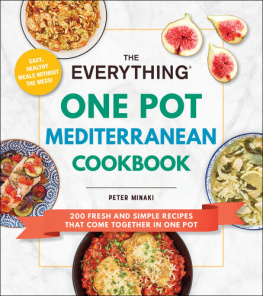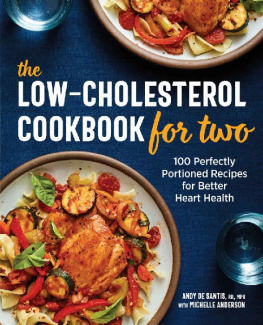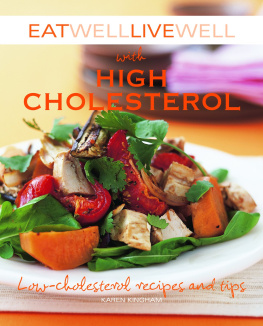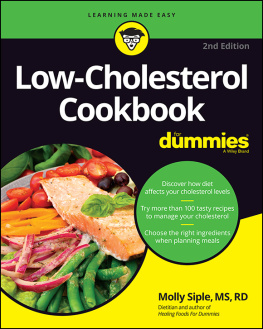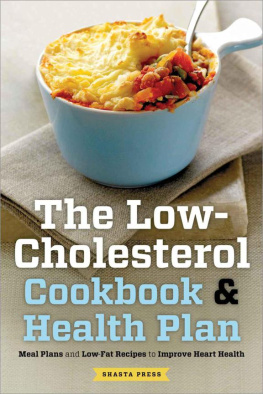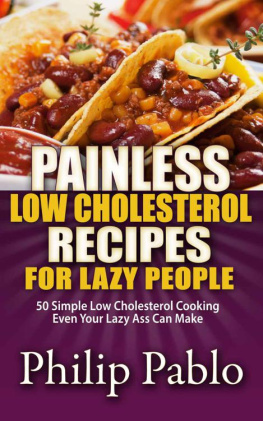500
LOW CHOLESTEROL RECIPES
FLAVORFUL HEART-HEALTHY DISHES YOUR
WHOLE FAMILY WILL LOVE
Dick Logue

Text 2009 Dick Logue
First published in the USA in 2009 by
Fair Winds Press, a member of
Quayside Publishing Group
100 Cummings Center
Suite 406-L
Beverly, MA 01915-6101
www.fairwindspress.com
All rights reserved. No part of this book may be reproduced or utilized, in any form or by any means, electronic or mechanical, without prior permission in writing from the publisher.
13 12 11 10 09 1 2 3 4 5
ISBN-13: 978-1-59233-396-7
ISBN-10: 1-59233-396-6
Digital edition: 978-1-61673-456-5
Library of Congress Cataloging-in-Publication Data
Logue, Dick.
500 low-cholesterol recipes : flavorful dishes your family will love / Dick Logue.
p. cm.
Includes index.
ISBN-13: 978-1-59233-396-7
ISBN-10: 1-59233-396-6
1. Low-cholesterol diet--Recipes. 2. Heart--Diseases--Diet therapy--Recipes. I. Title.
RM237.75.L64 2009
641.5638--dc22
2009012613
Printed and bound in Canada
The information in this book is for educational purposes only. It is not intended to replace the advice of a physician or medical practitioner. Please see your health care provider before beginning any new health program.
Dedication
To my wife, Ginger DeMarco, who has supported me through the good recipes and the failures.
Contents
INTRODUCTION
What Is This Cholesterol Thing Anyway?
These days it seems like the topic of lowering your cholesterol is on everyones lips. You see articles about it in your local newspaper and ads for medications on TV, and its become a common topic of conversation. Perhaps you are looking at this book because your doctor told you your cholesterol was high or borderline. It seems that terms like these are thrown out all the time. Perhaps you already have other heart or vascular problems that can be aggravated by elevated cholesterol. Or perhaps youre just trying to eat a heart-healthy diet.
Whatever the reason, you probably have questions like:
What is cholesterol, and how high does it have to be to be a problem?
Whats all this talk about good and bad cholesterol?
What kind of changes do I need to make to my diet and lifestyle to lower my cholesterol?
Who are you and why are you writing this book?
In this introduction, were going to try to answer some of those questions. Well look at lowering your cholesterol primarily from a dietary standpoint because, after all, this is a cookbook. But Ill also mention some of the other things that can also help. What Im not going to do is give you medical advice. You should always talk to your doctor or other health care provider if you have medical questions.
A Quick Basic Course in Cholesterol
To start, lets see if we can come up with a simple explanation of what cholesterol is and how it affects our health. Cholesterol is a fatty substance that exists in all of our bodies. Some of our organs, like the brain and the heart, actually need cholesterol to perform their functions. It travels through the body in the bloodstream and is processed by the liver. So far, thats not a problem. The problem comes when we have excess cholesterol. It can attach itself to the walls of our blood vessels, forming a substance called plaque, which is really just cholesterol that the body stores in a blood vessel and is covered over with a protective coating. But there are several problems with that. One is that the plaque can build up to the point where it can block a blood vessel. This can cause a restriction of blood flow to important organs like the heart and the brain. The other problem occurs if the coating gets broken and the cholesterol gets released back into the bloodstream. This causes the body to send chemicals that help the blood to clot to try and get the cholesterol back under cover and can cause a blood clot. If that clot blocks an artery in the heart, thats what we call a heart attack. If it happens in the brain, thats a stroke.
The next question is what causes us to have high cholesterol. As youve probably heard in the advertisements on television, cholesterol is caused both by genetic factors and your diet. If your parents or grandparents had high cholesterol, the chances increase that you will too. The one thing doctors dont know at this point is whether that elevated risk is caused entirely by genetics or whether people whose parents had bad eating habits tend to eat the same way, meaning that even the hereditary risk may still be caused partly by diet. What we do know is that diet plays a major part in determining cholesterol levels. And the biggest culprit in our diets is saturated fats. Unfortunately, a lot of the things that we like to eat are high in saturated fats, such as fatty meats; fried foods; high-fat dairy products like whole milk, cream, and cheese made from whole milk; and commercial baked products. As we get into the recipes in this book, well look at some alternatives that are lower in saturated fats, but still taste good.
What about This Good and Bad Cholesterol?
When your doctor does a blood test to check your cholesterol levels, hes looking for a couple of different things. These are subcomponents of cholesterol, and they are not at all the same in terms of your health. The three primary ones most often tested for are low-density lipoproteins (LDL), high-density lipoproteins (HDL), and triglycerides. The levels of these cholesterol components are measured in mg/dl, the number of milligrams of the substance in a deciliter of blood. Let take a quick look at each of them.
LDL is commonly referred to as bad cholesterol. It is the part of your total cholesterol that plays the biggest role in blocking your arteries. When LDL attaches to an artery wall, it causes an inflammation that encourages more cholesterol to be deposited there, increasing the risk of a blockage or blood clot. Eating foods high in saturated fats is a major cause of an increase in LDL. The level of LDL that poses a risk is still a subject of discussion, but everyone agrees that anything over 200 mg/dl is dangerous. Some doctors believe that, depending on the source and on what other risk factors (like smoking and being overweight) you may have, even levels over 100 mg/dl may increase your risk of heart attack and stroke.
HDL is usually called the good cholesterol. HDL helps the body rid itself of the cholesterol deposits in the arteries. A high HDL level indicates that you probably have a low risk of heart attack. It has been recommended that men have an HDL of at least 40 mg/dl and women at least 50 mg/dl. The good news is that doing the things that lower your LDL tend to raise your HDL levels. And adding good fat to your diet helps to raise HDL. Some sources are fatty fish like tuna and salmon, olive and canola oil, and the oils found in nuts and soybeans. Some studies even suggest that a moderate amount of alcohol will raise your HDL.
The third major component of a typical cholesterol screening is triglycerides. Like LDL, triglycerides can contribute to a buildup of deposits in the arteries. And like LDL, they are raised by a diet high in saturated fats. Its recommended that triglyceride levels be less than 150 mg/dl.
It should probably be noted that a number of doctors believe that the ratio between HDL and LDL is even more important than the individual numbers. So anything we do to lower our LDL or raise our HDL has a positive effect on that ratio.
How Do I Lower My Cholesterol?


